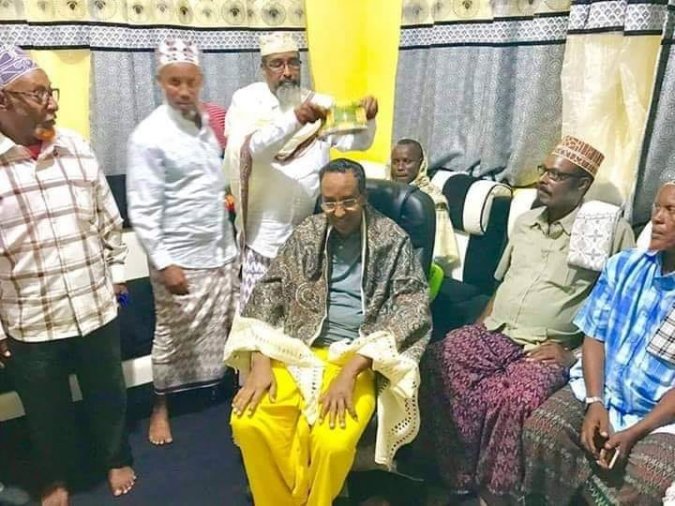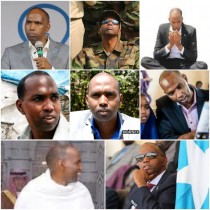
Somalia faces the worst undemocratic political Election in 2020
Today, the Somali elite bear the responsibility of defending the constitutional democratic system of governance founded on the principles of freedom and the rule of law and of acting on the wisdom of Thomas Jefferson who said the following more than 230 years ago :

"An elective despotism was not the government we fought for; but one which should not only be founded on free principles, but in which the powers of government should be so divided and balanced among several bodies of magistracy, as that no one could transcend their legal limits, without being effectually checked and restrained by the others…..The time to guard against corruption and tyranny, is before they shall have gotten hold on us. It is better to keep the wolf out of the fold, than to trust to drawing his teeth and talons after he shall have entered.”
Former President of Italy, Sandro Pertini said, "I corrotti e i disonesti sono indegni di appartenere al popolo italiano, e devono essere colpiti senza alcuna considerazione.” Indeed, Somali Leaders who defy the rule of law, ignore the will of the people, avail or tolerate corruption and dishonesty should feel public protest, anger, and revolt.
The 2016/17 elections were marred by lack of legal framework, outright fraud, corruption, vote-buying, lack of transparency and accountability, and foreign money and manipulations. The mismanagement of the electoral process deepened public distrust in democratic government and international partners’ stands on democracy.
SAFERWORLD in cooperation with Puntland Non State Actors Association (PUNSAA) and Somalia South Central Non State Actors Association (SOSCENSA), EU Election Mission Experts, Professor Brendon J Canon, and Victor Marsai conducted 2016/2-017 post electoral analysis and published their findings and recommendations. Despite introductory sugarcoating claims of progress because of limited incidences of political violence and the defeat of incumbent president, the 2016/2017 elections were well below tolerable basic democratic standards.
In 2016, the Somali political stakeholders agreed that "under no circumstance shall the 4.5 clan based power sharing arrangement be used beyond 2016 elections.” Alternatively, they agreed that the 2020/2021 election will be free, fair, and credible one person one vote democratic election. Unfortunately, that decision remained ignored.
A briefing put out by the Office of the UN Secretary General on August 1, noted, "The AU-UN review said that elections in Somalia are a key indicator of progress on the country’s path towards becoming a fully functioning federal state. However, there has been little movement on the necessary preparations.” Rather, the federal government has been focused on undoing the democratization process.
The general consensus is that there will not be any legitimate competitive free and fair one person one vote election in Somalia in 2020/2021. To the contrary, the 2020/2021 election will be the worst undemocratic political election in the Somali history. The corrupt lessons learnt in the past elections are perfecting new fraudulent tactics and measures to be implemented before election date. In parallel, the international influence is growing beyond control.
President Farmajo gave high priority to capture the state power by placing the federal parliament and the federal member states (FMS) under his control so that the federal parliament and presidents of the FMS rubber stamp his blatant undemocratic political agenda and abolish oversight and accountability responsibilities. The executive branch’s usurpation of the federal parliament’s responsibilities and broad-day rigging of the southwest state 2018 presidential election marked the end of confidence in the federal government to adhere to the rule of law.
The stalled political negotiations between the Federal Government and federal member states since 2018 has resulted major political issues pending. The continuing backlog of political issues has created perilous conditions for national disintegration and civil strife.
After 2 years of deliberate neglect, on May 2, 2019, the Council of Ministers of the federal government of Somalia approved draft electoral and political party laws supposed to regulate democratic elections in Somalia. Both laws were prepared undemocratically and so they defy political, legal, and intellectual rationale and assumptions. They fail to adhere to the letter and spirit of the provisional constitution, to the principles of federalism, legitimacy, and accountability and public political participation and they threaten the shared aspirations of the Somali people for harmony and solidarity.
The laws need extensive legal editing as some words used are ambiguous and subject to different interpretations or for verbosity. Non-state stakeholders like civil society and opposition groups didn’t participate in the preparation of the draft laws.
The website of the National Independence Electoral Commission (NIEC), the sole institution constitutionally established for the administration of elections, lists the laws and regulations necessary before holding free and fair one person one vote election in 2020. The prime law mentioned is the completion of the provisional constitution that should settle definitively many questions about political representation of the people and choice of the electoral system and political party system; the citizenship question; the population census; the criteria for the determination of the constituencies and their borders; and the respective roles of the federal and state institutions, including the judicial system, in the federal and state elections. That prime law and many other laws have not been prepared let alone approved. Laws will require regulations and time for civic education.
Article 11 (3) of the electoral law revived the contradictions between articles 89 (1, 3) and IIIG (2) (a) of provisional constitution concerning on the election of the president. Since the federal parliament elects the president, the NIEC has no role to play in the affairs of the federal parliament.
The proposed electoral law mandates voter registration of voters who are citizens of 18 years and older of the federal republic of Somalia. Each voter will receive voting cards. Voter registration supposes the existence of civic registration that establishes citizen’s information – date of birth and death, status of marriage, and etc. The proposed electoral system is the proportional representation of closed list.
In October 2014, the United Nations Fund for Population Activities (UNFPA) released population estimation survey of pre-war 18 regions of Somalia which estimated the total number of the Somali population about 12.3 million individuals, divided into 4 categories: urban (42.3%), rural (22.8%), nomadic (25.9 %), and internally displaced people (9%). The survey was a stepping stone for national census as prerequisite for "equality of the vote.”
All political parties are required to present the list of their candidates by respecting "the balance” in the Somali society. The word "balance” probably stands for "clan balance.” In addition, the political parties are required to respect 30% women’s quota and the representation of the disable people and minority communities.
The law allows the NIEC to change the registration system if deems necessary. It is not specifying the state and federal courts that have jurisdiction over the electoral disputes and complaints against NIEC decisions and electoral results.
NIEC has the exclusive power to determine the number of constituencies and number of polling stations. It’s also given the power to declare the election date which implies that it has the prerogative for postponing election date without restrictions. The final results of the elections should be approved and declared by the constitutional court which is not formed for political reasons.
Article 12 (2) of the proposed electoral law stipulates that the election will take place where it is possible which means that many groups will certainly be excluded from casting their votes in the election and the results will be skewed. Furthermore, article 12 (3) states that the seats of the Upper House will be distributed and elected according to article 72 of the provisional constitution which changes the 2016 agreed formula.
Many communities are unhappy about the current political representation of 4.5 clan formula for different reasons, including the principle of "equality of the vote.” In divided societies, skewed results for exclusions, marginalization, and manipulations are immediate source for conflict and violence.
The impracticability and flaws of the chosen electoral system have been discussed in a recently published report of the Heritage Institute for Policy Studies (HIPS), titled, "Somalia: In Search of a Workable 2020 Electoral Model.” The report has illustrated the flaws of the Proportional Representation models unveiled in Baidoa (Baidoa Proposal) and Kismaio (Kismaio Proposal) and put forward an alternative Electoral Model called "The Modified Enhanced Legitimacy Proposal (MELP),” responding to the current Somali political situation. Proposed electoral Models fall far short of meeting satisfactorily with most of the 7 standards set in the report.
The political party law is poorly written. The premature registration of political parties is public misdirection and waste of time and resources. There are many issues that have priority over the registration of political parties. Article 4 (C) of the political party law decertifies all registered political parties. While the federal republic of Somalia is torn apart, the political party law requires that political parties must have representation at least in 12 of the 18 regions.
The preparation for the transition to universal suffrage based on political parties has lost momentum and any attempt to create mishmash process that incorporate 4.5 clan formula and political party system will more likely increase election fraud, political disillusionment and disenfranchisement. None of the prerequisites for legitimate and credible universal elections– such as finalization of the constitutional review, national unity, peace and security, functional institutions, particularly independent judiciary and electoral bodies, electoral legal framework – had been adequately addressed and signed off. In addition, the unresolved political and legal status of Somaliland and Benadir region is threatening the stability and integrity of the South-Central Somali political system.
It’s my humble suggestion that the second best electoral option for 2020/2021 election will continue to be the democratization of the 4.5 clan based power sharing formula by developing special verifiable guidelines for within clan elections. International community should not encourage false election process subverting democracy further in 2020. Another fake election will propel Somalia into long term state failure, expansion of terrorism, endemic corruption, piracy, and exodus of refugees.
Dr. Mohamud M Uluso
Leave a comment
| Copyright © 2009 - 2026 Sunatimes News Agency All Rights Reserved. |
| Home | About Us | Diinta | Reports | Latest News | Featured Items | Articles | Suna Radio | Suna TV | Contact Us |
 0
0 









Somalia faces the worst undemocratic political Election in 2020
President Mohamed Abdullahi Farmajo was elected in 2017 to accelerate the building and strengthening of "a federal, sovereign, and democratic republic founded on inclusive representation of the people, a multiparty system, and social justice,&qu